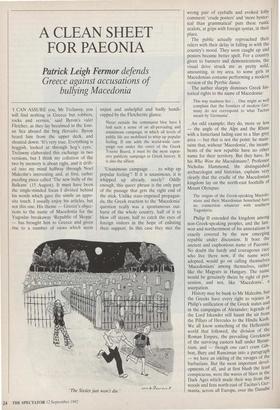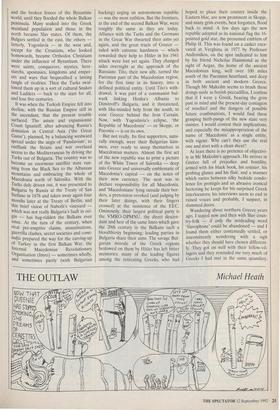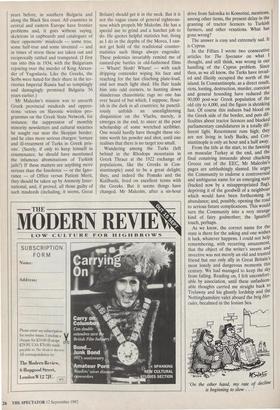A CLEAN SHEET FOR PAEONIA
Patrick Leigh Fermor defends
Greece against accusations of bullying Macedonia
CAN ASSURE you, Mr Trelawny, you will find nothing in Greece but robbers, rocks and vermin,' said Byron's valet Fletcher, as they lay becalmed in the Ioni- an Sea aboard the brig Hercules. Byron heard him from the upper deck, and shouted down: `It's very true. Everything is hoggish, looked at through hog's eyes.' Trelawny elaborated this exchange in two versions, but I think my collation of the two by memory is about right, and it drift- ed into my mind halfway through Noel Malcolm's interesting and, at first, rather puzzling piece called 'The new bully of the Balkans' (15 August). It must have been the single-minded focus I divined behind his words which gave the simile an appo- site touch. I usually enjoy his articles, but not this one. His theme — Greece's objec- tions to the name of Macedonia for the Yugoslav breakaway `Republic of Skopje' — has brought him to Greece and given rise to a number of views which seem
unjust and unhelpful and badly handi- capped by the Fletcherite glance.
Never outside the communist bloc have 1 had such a sense of an all-pervading and unanimous campaign, in which all levels of public life are mobilised to whip up popular feeling. If one adds the world-wide cam- paign run under the cover of the Greek Tourist Board, it must be the most expen- sive publicity campaign in Greek history. It is also the silliest.
`Unanimous campaign . . . to whip up popular feeling'? If it is unanimous, it is whipped up already, surely? Oddly enough, this queer phrase is the only part of the passage that gets the right end of the stick. Unlike state-imposed propagan- da, the Greek reaction to the `Macedonia' question really was a spontaneous out- burst of the whole country, half of it to blow off steam, half to catch the eyes of foreign visitors in the hope of enlisting their support. In this case they met the 'The Sixties just won't die.' wrong pair of eyeballs and evoked lofty comment: 'crude posters' and `more hyster- ical than grammatical' puts these rustic zealots, at grips with foreign syntax, in their place.
The public actually reproached their rulers with their delay in falling in with the country's mood. They soon caught up and posters became better spelt. For a country given to banners and demonstrations, the visual drive struck me as pretty mild, amounting, in my area, to some girls in Macedonian costume performing a modern version of the Pyrrhic dance.
The author sharply dismisses Greek his- torical rights to the name of Macedonia:
This way madness lies . .. One might as well complain that the frontiers of modern Ger- many do not correspond to what Tacitus meant by 'Germania'.
An odd example; they do, more or less — the angle of the Alps and the Rhine with a hinterland fading east to a Slav grey area — but that is not the point: he main- tains that, without `Macedonia', the incum- bents of the new republic have no other name for their territory. But they have. In his Who Were the Macedonians?, Professor Nicholas Hammond, the distinguished archaeologist and historian, explains very clearly that the cradle of the Macedonian kingdom lay on the north-east foothills of Mount Olympus: The origins of the Greek-speaking Macedo- nians and their Macedonian homeland have no connection whatever with southern Yugoslavia.
Philip II extended the kingdom among non-Greek-speaking peoples, and the last- won and northernmost of his annexations is exactly covered by the new emerging republic under discussion. It bore the ancient and euphonious name of Paeonia. No doubt the hardy and courageous race who live there now, if the name were adopted, would go on calling themselves `Macedonians' among themselves, rather like the Magyars in Hungary. The name would be genuinely theirs by right of pos- session, and not, like `Macedonia', a usurpation.
History may be bunk to Mr Malcolm, but the Greeks have every right to rejoice in Philip's unification of the Greek states and in the campaigns of Alexander; legends of the Lord Iskander still haunt the air from the Pillars of Hercules to the Hindu Kush. We all know something of the Hellenistic world that followed, the division of the Roman Empire, the prevailing Greekness of the surviving eastern half under Byzan- tium, and — though one can't cram Gib- bon, Bury and Runciman into a paragraph — we have an inkling of the ravages of the barbarians. But the most important devel- opments of all, and at first blush the least conspicuous, were the waves of Slays in the Dark Ages which made their way from the woods and fens north-east of Tacitus's Ger- mania, across all Europe, over the Danube
and the broken fences of the Byzantine world, until they flooded the whole Balkan peninsula. Many soaked into the Greek mainland population and those in the north became Slav states. Of them, the Bulgars settled in the east, the others — latterly, Yugoslavia — in the west and, except for the Croatians, who looked homewards, became Orthodox Christians under the influence of Byzantium. There were saints, conquerors, mystics, here- slarchs, apostasies, kingdoms and emper- ors and wars that bequeathed a lasting tangle of rivalries. Then the Turks swal- lowed them up in a sort of cultural Snakes and Ladders — back to the start for all, and lose five centuries.
It was when the Turkish Empire fell into decline, with the Russian Empire still in the ascendant, that the present trouble surfaced. The astute and expansionist Count Ignatieff, after advancing Russia's dominion in Central Asia ('the Great Game'), planned, by a balancing westward spread under the aegis of Panslavism', to outflank the Straits and win overland access to the Mediterranean by driving the Turks out of Bulgaria. The country was to become an enormous satellite state run- ning from the Black Sea to the Albanian mountains and embracing the whole of Macedonia north of Salonika. With the Turks duly driven out, it was presented to Bulgaria by Russia at the Treaty of San Stefano in 1878 and taken away again four months later at the Treaty of Berlin, and this brief vision of Naboth's vineyard — Which was not really Bulgaria's fault in ori- gin — has hag-ridden the Balkans ever since. At the turn of the century, when rival pre-emptive claims, assassinations, guerrilla clashes, secret societies and comi- tadjis prepared the way for the carving-up of Turkey in the first Balkan War, the Internal Macedonian Revolutionary Organisation (Imro) — sometimes wholly, and sometimes partly (with Bulgarian backing) urging an autonomous republic — was the most ruthless. But the frontiers, at the end of the second Balkan War, were roughly the same as they are today. Alliance with the Turks and the Germans in the Great War thwarted their aims yet again, and the great tracts of Greece — ruled with extreme harshness — which rewarded their help to Hitler in his 1941 attack were lost yet again. They changed sides overnight at the approach of the Russians: Tito, their new ally, turned the Paeonian part of the Macedonian region, for the first time in its history, into a defined political entity. Until Tito's with- drawal, it was part of a communist bul- wark linking Hoxha's Albania to Dimitroff's Bulgaria, and it threatened, with like-minded help from the south, to ease Greece behind the Iron Curtain. Now, • with Yugoslavia's eclipse, 'the Republic of Macedonia' — or Skopje, or Paeonia — is on its own.
But not really. Its first supporters, natu- rally enough, were their Bulgarian kins- men, ever ready to steep themselves in Macedonian matters. Almost the first act of the new republic was to print a picture of the White Tower of Salonika — deep into Greece and universally emblematic of Macedonia's capital — on the notes of their new currency. The next was to declare responsibility for all Macedonia, and 'Macedonians' lying outside their bor- ders, a pretension revoked (and judging by their later doings, with their fingers crossed) at the insistence of the EEC. Ominously, their largest political party is the VMRO-DPMNU, the direct descen- dant and heir of the same Imro which gave the 20th century in the Balkans such a bloodthirsty beginning; leading parties in Bulgaria share their aims. The savage Bul- garian misrule of the Greek regions bestowed on them by Hitler has left bitter memories; many of the leading figures among the retreating Greeks, who had
hoped to place their country inside the Eastern bloc, are now prominent in Skopje, and many grim events, best forgotten, flood back to mind. A few days ago the new republic adopted as its national flag the 16- pointed gold star, the presumed emblem of Philip II. This was found on a casket exca- vated at Verghina in 1977 by Professor Andronikos, on the spot indicated to him by his friend Nicholas Hammond as the sight of Aegae, the home of the ancient Macedonian king, well over 100 miles south of the Paeonian heartland, and deep in both ancient and modern Greece. Though Mr Malcolm seems to brush these doings aside as boyish peccadillos, I confess that if I were a Greek, bearing the grim past in mind and the present-day contagion of mischief and the dangers of possible future combinations, I would find these grasping birth-pangs of the new state very sinister. I would contest their implications, and especially the misappropriation of the name of 'Macedonia' as a single entity, with vigour. Why can't they use the real one and start with a clean sheet?
At least there is no pretence of objectivi- ty in Mr Malcolm's approach. He arrives in Greece full of prejudice and hostility, armed with his black book, his sottisier, his probing glance and his flair, and a manner which varies between silky bedside condo- lence for protégés and an abrasive ironical hectoring he keeps for his surprised Greek interlocutors; his interviews seem to end in raised voices and probably, I suspect, in slammed doors.
Wandering about northern Greece years ago, I stayed now and then with Slav coun- try-folk — if only the misleading word `Slavophone' could be abandoned — and I found them either contentedly settled, or intermittently wondering with a sigh whether they should have chosen different- ly. They got on well with their fellow-vil- lagers and they reminded me very much of Greeks I had met in the same quandary, years before, in southern Bulgaria and along the Black Sea coast. All countries in central and eastern Europe have frontier problems and, it goes without saying, skeletons in cupboards and catalogues of their opponents' misdeeds — some true, some half-true and some invented — and in times of stress these are taken out and reciprocally rattled and trumpeted. (I first ran into this in 1934, with the Bulgarians rejoicing over the murder of King Alexan- der of Yugoslavia. Like the Greeks, the Serbs were hated for their share in the ter- ritories Imperial Russia had so temptingly and damagingly promised Bulgaria 56 years earlier.) Mr Malcolm's mission was to unearth Greek provincial misdeeds and oppres- sions: vetoes on Slavonic wireless pro- grammes on the Greek State Network, for instance; the suppression of monthly minority newsletters and cultural societies he sought out near the Skopjan border; and he cites more serious charges: 'torture and ill-treatment of Turks in Greek pris- ons'. (Surely, if only to keep himself in countenance, he should have mentioned the infamous abominations of Turkish jails?) If these matters are anything more serious than the Insolence — or the Igno- rance — of Office versus Patient Merit, they should be taken up by Amnesty Inter- national, and, if proved, all those guilty of such misdeeds (including, it seems, Great Britain) should get it in the neck. But it is not the vague cause of general righteous- ness which propels Mr Malcolm. He has a special axe to grind and a hatchet job to do. He quotes helpful statistics but, living as I do in the depths of the Morea, I can- not get hold of the traditional counter- statistics such things always engender. These polemics invariably remind me of custard-pie battles in old-fashioned films — Wham! Slosh! Wham! — with each dripping contender wiping his face and reaching for the last clinching plate-load, and not much light shed. His flair leads him into odd corners, to hunting down slanderous chauvinistic rags no one has ever heard of but which, I suppose, flour- ish in the dark in all countries; he punctil- iously unfolds an unenlightening disquisition on the Vlachs, merely, it emerges in the end, to sneer at the poor scholarship of some wretched scribbler. One would hardly have thought these vic- tims worth his powder and shot, until one realises that there is no target too small.
Wandering among the Turks (left behind in the Rhodope mountains in Greek Thrace at the 1922 exchange of populations, like the Greeks in Con- stantinople) used to be a great delight; they, and indeed the Pomaks and the Kizilbashi, lived on excellent terms with the Greeks. But it seems things have changed. Mr Malcolm, after a six-hour drive from Salonika to Komotini, mentions, among other items, the present delay in the granting of tractor licences to Turkish farmers, and other vexations. What has gone wrong? The answer is easy and extremely sad. It is Cyprus.
In the Fifties I wrote two consecutive articles for The Spectator on what I thought, and still think, was wrong in our handling of the Cyprus problem. Since then, as we all know, the Turks have invad- ed and illicitly occupied the north of the island. In Constantinople, as a direct result, riots, looting, destruction, murder, coercion and general hounding have reduced the 90,000 post-war Greek population of the old city to 4,000, and the figure is shrinking fast. Of course this induces bad blood on the Greek side of the border, and puts dif- ficulties about tractor licences and blocked parliamentary candidatures in a totally dif- ferent light. Resentment runs high; they are not living in leafy Bucks, and Con- stantinople is only an hour and a half away.
From the title at the start, to the fawning on muscular Turkey at the end, and the final conniving innuendo about chucking Greece out of the EEC, Mr Malcolm's pages are unblushingly slanted. He urges the Community to endorse a controversial and ambiguous name for an emerging state (backed now by a misappropriated flag), depriving it of the goodwill of a neighbour which would have been forthcoming In abundance; and, possibly, opening the road to serious future complications. This would turn the Community into a very strange kind of fairy godmother; the Ignatieff touch, perhaps.
As we know, the correct name for the state is there for the asking and one wishes it luck, whatever happens. I could not help remembering, with recurring amazement, that the object of the writer's sneers and invective was not merely an old and trusted friend but our only ally in Great Britain .s most lonely and dangerous moments this century. We had managed to keep the sky from falling. Reading on, I felt uncomfort- able by association, until these unfashion- able thoughts carried me straight back to Trelawny and his ghostly lordship and the Nottinghamshire valet aboard the brig Her- cules, becalmed in the Ionian Sea.
'On the other hand, my rate of decline is beginning to slow. .




































































 Previous page
Previous page